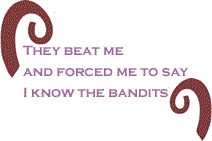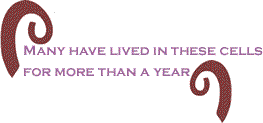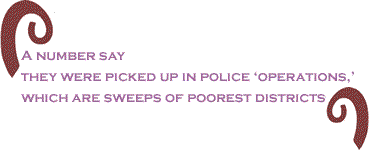
|
|||||||||||||||||||||
|
|
Ms. Scherr posted this article from Port-au-Prince. It appeared earlier in Counterpunch. Rays of Haiti's scorching noontime sun slip between the bars into the otherwise dark 8 by 10 foot cell, illuminating the sets of eyes that stare out at the visitors. My eyes adjust and the forms of children emerge. I count 16 boys. Most squeeze seated together on the upper and lower levels of the three bunk beds that fit into a tight "U." A few sprawl behind the seated ones or sit in the tight space on the concrete floor that separates the beds. Three more cells, each with 16 boys, adjoin this one. The youngest of the 64 children is 10. There are at least three 10-year-olds. The oldest is 17. Many have lived in these cells for more than a year. A journalist visiting Haiti for the third time, I'm accompanying San Francisco Bay Area human rights workers. With me at the children's prison is Sr. Stella Goodpasture, OP, Justice Promoter, Dominican Sisters of Mission San Jose and translator, guide, advisor and friend, Daniel Tillas.
We speak to the children one at a time through the bars of the first cell door and Sister Stella offers each the packet of toiletries she has brought and her blessings. We talk with the children in the other three cells more briefly as they receive their packets. About 80 percent of those we interview have not been brought before a judge to be charged with a crime, something the Haitian constitution requires during the first 48 hours after arrest. Several children say they were brought to see a judge before being taken to jail as required, but the judge wasn't there, so they were locked up. Those who had actually seen a judge, such as Claude, 15, were simply read a summary statement of charges. "The judges won't give you a chance to talk. They let you be in here forever," Claude said. (While the youngsters are anxious for others to hear their stories and do not ask for anonymity, I am withholding their real names because they are children and they are not safe.)
Judges asked several children for money for their release. One judge demanded $5,000 U.S. for the child to get out of jail. None of the children has legal representation. While some children have been jailed for as long as 18 months, none reports being incarcerated before Feb. 29, 2004, when the U.S. flew President Jean-Bertrand Aristide into exile. (The U.S. says Aristide asked to go, but Aristide, now exiled in South Africa, says he was forced out.) One guard tells me many of the children were jailed as "preventive detention," though the children do not explain their incarceration in that way. A number say they were picked up in police "operations," which are sweeps of poorest districts, during which police and/or United Nations soldiers cast a wide net, looking for individuals who may be "bandits" or "chimères," often code words for Aristide supporters. Samuel, 12, has been locked up since Dec. 12, 2004. He was in his home, building a birdhouse, when police came inside and arrested him as part of an "operation." Sylvan, 16, has been jailed since July 5, 2004, caught up in a police sweep. Paul, 15, was also picked up in a police sweep, arrested with others in his family home and incarcerated since April 28, 2004. Ronald, 17, has been in prison since July 21, 2004, picked up while "the police were looking for bandits." Raymond, 14, got picked up Dec. 5, 2004 in a police "operation." One of the few, his parents visit every Sunday. Daniel, 10, was arrested Dec. 12, 2004 and is accused of murder. Edwin, 15, was found smoking marijuana and has been jailed since May 29, 2004; Charles, 14, was accused of gang affiliation and has been jailed since May 12, 2004; Jacques, 17, was arrested Sept. 24, 2004 after a fight. Marc, 16, accused of rape, has been incarcerated since Nov. 24, 2004. Joseph, 16, has been in jail since March 24, 2004, accused of murder. The children do not claim mistreatment by prison guards, who walk out of earshot during the interviews, but some speak of police beatings at the time of their arrest. Jean, 15, has been locked up since January. When police arrested him "they asked me to tell them about the bandits." He told them he didn't know who they were. "They beat me and forced me to say I know the bandits," he said. Paul was also beaten during his arrest. "They beat us to say something," he said. A few of the children, such as Samuel, 14, and Edwin say their parents don't know where they are. (The existence of the children's jail is largely unknown in Port-au-Prince.) Some, but not all, are street children, orphans or those whose parents were unable to afford to keep them at home. Those few parents who visit speak to their children through the narrow cell door, as we are doing.
The kids leave their cells to shower and for a daily recreation period; they accomplish their toilet needs at shower and recreation time. They have a bucket to share at other times. The children said the Red Cross has come to visit them. Jean-Yves Clemenzo Port-au-Prince Red Cross spokesperson said he was unable to comment on the organization's role there. The organization's access to prisons depends on keeping discussions with authorities out of the public eye. "It's a long process," he said, acknowledging that the prison conditions in Haiti, in general, such as at the National Penitentiary and the Women's Prison present "a lot of needs." The Red Cross has installed a water system at the National Penitentiary, which had been lacking. Clemenzo also reiterated what is already well known in Haiti: "Many are in jail without due process." The Red Cross is addressing some of that need. "We're in discussions with the department of prison affairs to express our concerns," he said, noting a limitation of resources. (Attempts to meet with Thierry Fagart, U.N. human rights official, in Port-au-Prince or to get comments from him by phone or e-mail have been unsuccessful. The U.N. oversees police and jails in Haiti.) When we get to the last cell, the guards ask us to speed up our visit, as it is approaching time for recreation. We find one child lying on a back bunk, his head wrapped in what could have been a shirt. He is not interested in talking or getting up to receive the packet of toiletries. He says he's had a bad headache for five days. The children say they don't see doctors. The guards are unaware of the child's headache, and, in front of the visitors, call someone they say will give him medical attention. The visit weighs heavily on Sr. Stella. "I'm grief struck and shocked to see the children in the dark with no place to sleep," she says. I ask some of the children what they wish for. Many say education. "I'd like some training," says Edwin. "Something to help me be useful for my country." Others express hopelessness. "I need prayers," says Claude, jailed since July 11. "I don't know how long I'll stay here." Judith Scherr is a freelance writer in Berkeley.
|
|
| Home | |
Your comments are always welcome. Visit the Contact Us page to send e-Mail or Feedback or Click here to send e-Mail to [email protected] e-Mail re-print notice
If you send us an e-Mail message we may publish all or part of it, unless you tell us it is not for publication. You may also request that we withhold your name. Thank you very much for your readership. |
|
| October13 2005 Issue 154 |
|||||||||
|
|||||||||
|
|
|||||||||
| Printer Friendly Version in Plain Text or PDF format. Download free Adobe Reader. | |||||||||
 |
|||||||||
 |
|||||||||
| |
|||||||||
| |
|||||||||





























